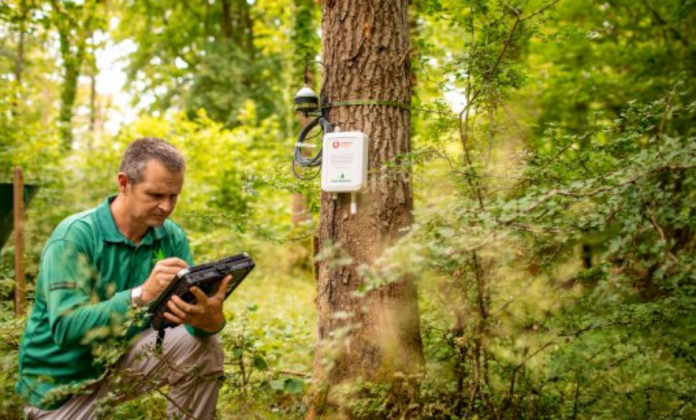Vodafone has partnered with the UK department for environment, food and rural affairs (Defra) and leading forestry group Forest Research to investigate how narrowband-IoT (NB-IoT) technology can help monitor tree growth and support research into the role of trees in tackling climate change.
The three-month pilot will use Vodafone’s NB-IoT network in the UK, in order to connect sensors and carry data about tree growth and environmental conditions in two forests in the UK. Sensors have been attached to several trees within different areas of the two forests, in Forestry England’s Alice Holt forest, in Surrey, and Harwood forest, in Northumberland. It is the first of its kind in the UK.
Data is being collected and transmitted to Defra and Forest Research, where analytics will assess the impact of temperature, humidity, and soil moisture on tree growth and function. UK scientists are looking to estimate the contribution of trees to climate change mitigation as a result of their ability to absorb and store carbon from the atmosphere.
Defra and Forest Research will use the results to inform policy makers and the public of how the changing environment impacts tree growth and the benefits that trees can provide by storing carbon.
Defra has outlined a 25-year ‘environment plan’ to increase woodland cover in England. The UK government has committed to increase tree planting across the UK to 30,000 hectares per year by 2025. The newly announced £640 million Nature for Climate Fund will invest in tree-planting alongside other environmental restoration over the next five years.
Vodafone has said it will power its European network with 100 percent renewable electricity no later than July 2021. It has committed to helping its business customers reduce their own carbon emissions by a cumulative total of 350 million tonnes globally between 2020 and 2030.
Anne Sheehan, director of Vodafone’s business division in the UK, said: “Tackling climate change requires radical thinking and our forests will be vital to this. Our IoT technology enables us to connect trees and monitor performance, which is a perfect example of how technology can be used in new ways to help create a more sustainable future.”
Malcolm McKee, chief technology officer at Defra, said: “The new technology provides better quality data and importantly, allows us to monitor places that current technologies cannot reach. We are always looking for ways to explore how using innovative new technologies can improve our data gathering. This initial focus is on the monitoring of forests, but the technologies will be applicable to monitoring ‘anything’ in the environment.”
Matthew Wilkinson, research scientist at Forest Research, said: “This project has the potential to transform the way we are able to collect and analyse data, and to reduce the need for frequent site visits, especially at remote rural locations.
“The project will also help us to gather more data which is critical to targeting efforts to measure the contribution of individual trees to climate change. If the trial is successful, we hope it will expand to other areas of environmental monitoring and signify a step change in the amount of data we are able to collect and analyse.”

